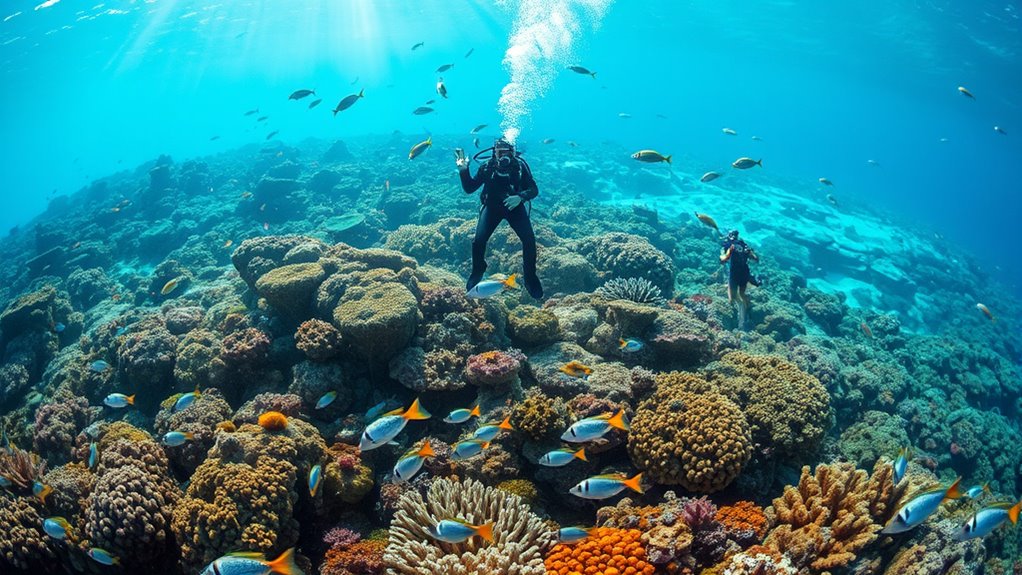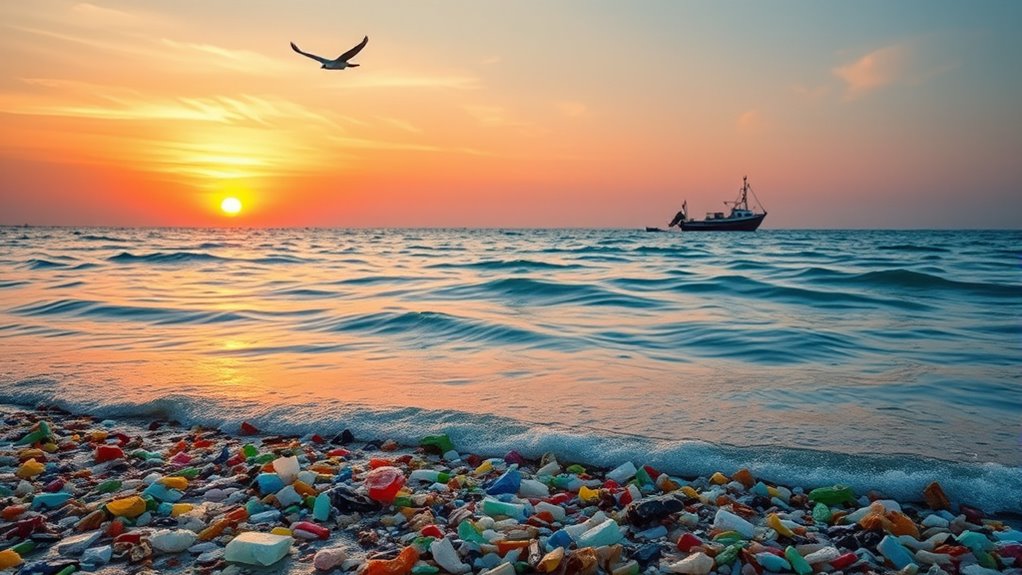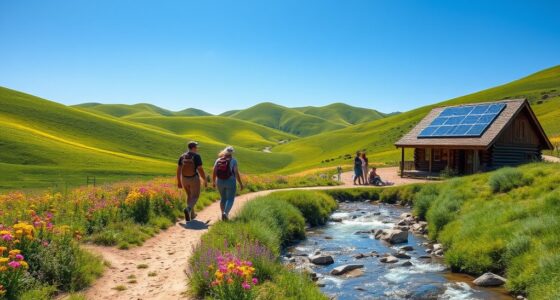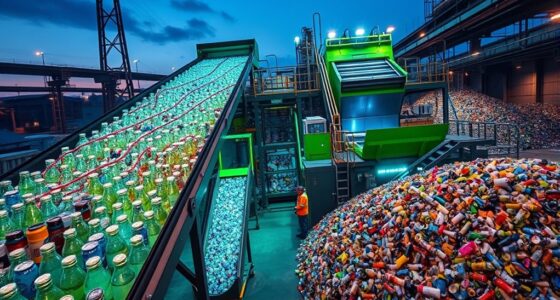Documentaries like “An Inconvenient Truth” and “Chasing Coral” have transformed the environmental movement by raising awareness about critical issues such as climate change and biodiversity loss. They underscore the urgency of taking action to protect our planet. Films like “Before the Flood,” “A Plastic Ocean,” and “David Attenborough: A Life on Our Planet” also play essential roles in inspiring advocacy and showcasing the repercussions of human consumption. Discover more influential documentaries that have sparked significant change.
Key Takeaways
- “An Inconvenient Truth” pioneered climate change advocacy, raising public awareness and inspiring a new generation of activists.
- “Before the Flood” highlighted global climate change impacts and the importance of renewable energy sources.
- “Chasing Coral” emphasized the urgent need for coral reef conservation in the face of climate change and pollution.
- “The Cove” sparked a global dialogue on wildlife protection, influencing policies against dolphin hunting practices.
- “Tapped” exposed the environmental costs of bottled water, driving awareness about plastic pollution and corporate exploitation.
Before the Flood: Raising Global Awareness on Climate Change

“Before the Flood” stands as a pivotal documentary that shines a light on the urgent issue of climate change. Released in 2016 and directed by Fisher Stevens, it features Leonardo DiCaprio, a UN Messenger of Peace, spearheading the narrative.
As you watch, you’ll journey across five continents and the Arctic, witnessing the stark effects of global warming—ice melting, rising sea levels, and the struggles of vulnerable communities. The film underscores that human actions are primary contributors to climate change, urging viewers to recognize their role in this pressing crisis. The incorporation of renewable energy sources such as solar and geothermal power is highlighted as essential to mitigating these impacts, and the importance of high vibrational energy in driving positive change is emphasized. Additionally, the documentary illustrates the potential of hydrogen fuel cells as a sustainable alternative to fossil fuels, showcasing their role in reducing pollution.
The film includes compelling interviews with figures like Barack Obama and Pope Francis, emphasizing the need for action. It tackles climate denial, highlights the Paris Agreement‘s significance, and calls for individual responsibility in combating climate change.
An Inconvenient Truth: Pioneering Climate Change Advocacy

*An Inconvenient Truth* revolutionized the conversation around climate change when it premiered in 2006. This groundbreaking documentary raised public awareness, earning two Academy Awards and grossing nearly $50 million worldwide.
By effectively explaining climate science through visual aids, it made complex information accessible to everyone. Al Gore’s personal experiences added a relatable touch, framing climate change as a moral imperative demanding immediate action. The film’s impact is evidenced by its ability to inspire a new generation of climate activists, showcasing its transformative cultural impact. Additionally, it highlighted the importance of awareness of these pitfalls in addressing environmental issues effectively. The documentary also coincided with a rise in renewable energy investments, emphasizing the urgency of transitioning to sustainable practices. Moreover, the film emphasizes high-quality equipment and effective communication techniques vital for spreading awareness about environmental issues.
The film inspired millions to engage in environmental activism, sparking a global movement. It also revitalized interest in documentaries as tools for social change, and many schools now use it in their curricula.
Its lasting legacy continues to influence climate discussions and advocacy efforts today.
Chasing Coral: The Plight of Coral Reefs

As the conversation around climate change evolves, the plight of coral reefs demands urgent attention.
*Chasing Coral*, a powerful documentary, captures the alarming decline of these essential ecosystems through striking underwater footage and compelling storytelling. You’ll see how rising sea temperatures lead to coral bleaching, threatening biodiversity and the livelihoods of millions. The documentary also emphasizes the importance of a supportive environment in conservation efforts to ensure the survival of these ecosystems. Furthermore, the film highlights that heat pump systems can be a key component in reducing energy consumption and mitigating climate change impacts. Chia seeds, with their high fiber content, can also support overall health during climate-related stress.
Filmed in stunning locations like the Florida Keys and Australia’s Great Barrier Reef, the documentary showcases over 500 hours of footage and highlights the 2014-2017 El Niño event that caused severe bleaching. The film poignantly illustrates that 75% of corals suffered or died from heat stress due to climate change during this period.
It urges you to engage in climate action, support conservation efforts, and advocate for policy changes. Ultimately, *Chasing Coral* inspires you to recognize the critical role coral reefs play in our planet’s health.
A Plastic Ocean: The Impact of Marine Plastic Pollution

While you might be aware of the pervasive issue of plastic pollution, *A Plastic Ocean* dives deep into its devastating effects on marine ecosystems.
This documentary showcases global research, revealing that approximately 8-10 million metric tons of plastic enter our oceans each year. Major sources include improper disposal of single-use plastics and industrial processes. The film’s production involved four years of filming across 20 global sites, capturing the shocking visual evidence of this crisis. Additionally, the documentary highlights the importance of omega-3 fatty acids, which are essential for marine life and are increasingly contaminated by plastics. The loss of biodiversity in marine ecosystems leads to ecosystem collapse, affecting food security and human health. Furthermore, the documentary underscores that emotional resilience is crucial for communities advocating for environmental protection and recovery.
The consequences are dire; plastic threatens marine life, contributing to species extinction and contaminating our food chain. As blue whales feed on krill mixed with plastics, even deep-sea creatures face microplastics that never degrade.
David Attenborough: A Life on Our Planet: A Personal Call for Conservation

David Attenborough’s documentary, *A Life on Our Planet*, serves as a powerful demonstration of the urgent need for conservation.
You’ll witness his personal journey and how his observations reflect the alarming human impact on Earth. The film highlights biodiversity loss and climate change, urging you to recognize the catastrophic consequences of inaction. Additionally, it emphasizes that over one-third of the weight of mammals consists of animals raised for food, underscoring the profound impact of human consumption on ecosystems. The environmental consequences of practices like wood-burning further exacerbate these issues, leading to air pollution and climate instability. Furthermore, the documentary draws attention to the importance of natural remedies as a means of supporting both personal health and the environment. Moreover, the reliance on renewable energy solutions, such as solar and wind power, is essential for reducing our carbon footprint and combating climate change.
Stunning visuals showcase both nature’s beauty and the damage we’ve caused. Attenborough challenges you to embrace solutions like rewilding, sustainable land use, and renewable energy.
By advocating for collective action and systemic change, he inspires you to rethink consumption patterns and support a more sustainable future.
Ultimately, the documentary serves as a personal call for you to join the fight for our planet.
An Inconvenient Sequel: Addressing Climate Solutions

Released in 2017, *An Inconvenient Sequel: Truth to Power* builds on the momentum of its predecessor by diving deeper into the urgent need for climate solutions.
You’ll witness the devastating impacts of climate change, like Hurricane Sandy and Typhoon Haiyan, highlighting the reality of rising sea levels and extreme weather. The film emphasizes the importance of sustainable practices such as using self-watering planters to reduce water waste in gardening.
The film spotlights the explosive growth of renewable energy, with solar and wind jobs surpassing fossil fuel employment, as the solar industry jobs now outnumber coal jobs. Additionally, transitioning to energy-efficient systems, like heat pumps, can significantly lower carbon emissions and enhance sustainability. Regular maintenance of heat pump systems can further optimize their efficiency and reduce energy costs.
Al Gore’s commitment to global policy, particularly the Paris Climate Accord, showcases the importance of advocacy.
It calls on you to support shifts toward 100% renewable energy in your community.
The Cove: Influencing Wildlife Protection Policies

As the 2009 documentary *The Cove* reveals the shocking reality of dolphin hunting in Japan, it not only exposes brutal practices but also ignites a global conversation about wildlife protection. The film’s haunting imagery of the annual dolphin hunts in Taiji changed public perceptions worldwide, leading to protests and activism against these inhumane practices.
By showcasing the ethical implications of dolphin captivity and slaughter, *The Cove* critiques speciesism and emphasizes the need for a shift in human-animal relationships. Additionally, its impact has led to significant demand drop for dolphin meat in Japan, as reported by local officials. The documentary has highlighted the importance of community resilience in advocating for sustainable wildlife protection. Furthermore, it has inspired many to adopt sustainable living practices, showcasing how personal action can lead to broader change.
Its impact has resonated globally, influencing consumer behavior and educational initiatives. However, the documentary also faced backlash, highlighting the challenges of changing deeply rooted cultural practices. Ultimately, it became a powerful tool for animal rights advocacy and policy engagement.
Eyes of the Orangutan: Exposing Exploitation in Tourism

*Eyes of the Orangutan* exposes the dark underbelly of the wildlife tourism industry, revealing the exploitation that orangutans endure for entertainment and profit.
Created by Aaron Gekoski, this documentary dives into the cruel conditions faced by these sentient beings across Malaysia, Indonesia, Thailand, and Vietnam.
You witness firsthand how mothers are killed, babies are taken, and orangutans are forced into degrading performances. The film also sheds light on the multi-billion-dollar market that perpetuates these abusive practices.
It highlights the role of social media in promoting cruel attractions, often without tourists realizing the suffering involved.
By showcasing rescue efforts from organizations like the Borneo Orangutan Survival Foundation, the film aims to inspire change.
Ultimately, it encourages you to rethink your travel choices and support ethical tourism practices for a better future for these magnificent creatures.
Tapped: The Environmental Cost of Bottled Water

While many people reach for bottled water without a second thought, the documentary *Tapped* reveals the significant environmental costs that come with that convenience.
Directed by Stephanie Soechtig, this 2009 film highlights the pollution caused by plastic bottles made from petroleum and the staggering fact that only 20% get recycled in the U.S.
You’ll learn that about 40% of bottled water is simply filtered tap water, yet companies like Nestlé and Coca-Cola profit immensely from reselling it. The film also explores how bottled water contributes to global warming and community exploitation, especially during droughts, and emphasizes that 40% of bottled water is essentially repurposed tap water.
The True Cost: Unpacking Fast Fashion’s Environmental Impact

Fast fashion, with its rapid production cycles and low prices, has become a staple in modern consumer culture, yet few realize the devastating environmental impact it brings.
The documentary “The True Cost” exposes how this industry is the second-largest polluter globally, contributing 10% of carbon emissions and consuming massive amounts of water, especially in denim production. Fast fashion’s reliance on cheap production exacerbates environmental degradation, leading to severe pollution and unsafe working conditions in developing countries.
It highlights that 85% of textiles end up in landfills, while microplastics from synthetic fibers pollute our oceans.
The film also sheds light on labor exploitation, revealing unsafe working conditions and inadequate wages for many workers.
Frequently Asked Questions
How Do Documentaries Influence Public Policy on Environmental Issues?
Documentaries influence public policy on environmental issues by raising awareness and shaping public opinion.
When you watch these films, you’re exposed to compelling narratives that highlight urgent problems, often leading you to engage in discussions and advocate for change.
They present credible data and personal stories, which can inspire you to support legislative reforms.
As more viewers rally behind these causes, they create public pressure, prompting policymakers to take action on critical environmental issues.
What Role Do Filmmakers Play in Climate Activism?
Think of filmmakers as the rockstars of climate activism, using their creativity to spark change. They weave compelling narratives that engage you emotionally, pushing you to care about environmental issues.
Can Documentaries Drive Personal Behavior Changes Effectively?
Absolutely, documentaries can drive personal behavior changes effectively.
When you watch a compelling film, it engages your emotions and presents new information that reshapes your perspective. This emotional connection often motivates you to adopt sustainable practices or rethink your consumption habits.
How Are These Films Distributed and Promoted to Reach Wider Audiences?
Imagine casting a net across the ocean, hoping to catch the attention of many. That’s how filmmakers distribute and promote documentaries.
You’ll find them at vibrant film festivals or in local community screenings, reaching enthusiastic audiences. Online platforms like Netflix and YouTube broaden their reach, making films accessible to all.
With emotional storytelling and targeted campaigns, they inspire you to engage and act, transforming passive viewers into passionate advocates for change.
What Are Some Criticisms of Environmental Documentaries?
You might notice that environmental documentaries often face criticism for lacking critical engagement and reinforcing dominant Western narratives. They can portray racialized communities as passive victims, risking paternalism.
Additionally, some use fear tactics, leading to viewer fatigue. While they raise awareness, documentaries may struggle to inspire long-term action.
Ultimately, their focus on specific issues can overshadow broader systemic problems, limiting their effectiveness in driving meaningful change.
Conclusion
These documentaries are more than just films; they’re modern-day prophets, echoing the call to action we’ve long ignored. Like a wake-up call in the dead of night, they shine a light on the environmental crises we face, urging you to rise and make a change. As you turn off your screen, remember that each choice you make can ripple through the world, much like those documentaries have. Your voice matters—be the change the planet so desperately needs.









